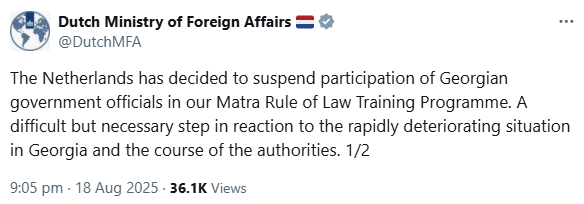Repression and program suspension: How “Georgian Dream” is leading Georgia into isolation
- Kitty Jashi

- Aug 21, 2025
- 3 min read
Updated: Aug 25, 2025
Netherlands pull the ripcord
The Dutch government has decided to suspend the participation of Georgian government officials in the MATRA rule of law program . Its reason: the rapid deterioration of the political situation in Georgia and the government's repressive actions.

An official statement from the embassy states that nearly 200 Georgian officials have participated in the program so far, supporting the strengthening of public institutions. However, given recent developments, the Netherlands has no choice but to withdraw for the time being:
"The temporary suspension is due to the rapidly deteriorating situation in the country, which is the result of deeply worrying actions by the Georgian authorities. We sincerely hope that the situation in the country will improve so that we can welcome Georgian participants again in the future."
Clear demands from The Hague
In its statement, the Dutch Foreign Ministry makes it unmistakably clear what it expects from “Georgian Dream”:
Punish those responsible for violence against journalists and demonstrators.
Repeal repressive laws.
Release all political prisoners.
While The Hague is still diplomatically speaking of a “difficult decision,” the core of the matter is clear: it is not Europe that has turned its back on Georgia, but “Georgian Dream” on Europe.
L.Ch: “A loss for the future of the country”
L.Ch, an employee of the Constitutional Court and a participant in the program, wrote:
"As a civil servant at the Constitutional Court of Georgia, I had the privilege of participating in the MATRA Rule of Law Program on Integrity in Public Service. This was a truly valuable and enriching experience—both professionally and personally. It is all the more devastating that future Georgian civil servants are denied the opportunity to participate in such programs. The responsibility for this unfortunate outcome lies with the current government and its propaganda-driven policies."
Tako Kavkasidze: Knowledge that is now lost
Tako Kavkasidze, a former employee of the Ministry of Regional Development, also lost her job after signing a petition in defense of the Constitution. In an interview with Tbilisi24 , she said:
"My program was called 'Integrity in Public Service.' We went to The Hague, Brussels, and later to North Macedonia. We heard lectures from high-ranking European experts and discussed political developments. I used the knowledge I gained until my last day of work. For me, this one-month program was as valuable as a long-term course of study."
Regarding the suspension, she adds:
"It is regrettable that Georgia is being excluded at a time of important geopolitical developments. However, the decision does not surprise me. The Netherlands has clearly signaled that it will not cooperate with a regime that openly opposes Europe."
Lana Kardava: “A Land in Darkness”
Lana Kardava, a former employee of the Tbilisi City Administration and also a MATRA graduate, sees the suspension as further evidence of Georgian Dream’s self-isolation policy:
"A regime that relies on psychological terror, fear manipulation, and Russian propaganda is doing everything it can to deprive Georgia and its citizens of any prospect of integration into the civilized world. (...) While propaganda with slogans like 'Mother is mother, father is father' clouds people's minds, darkness is spreading more and more in Georgia."

Historical context: MATRA since 1993
The MATRA program was launched by the Netherlands in 1993 to promote democratization in Central and Eastern Europe. It accompanied the social transformation of post-communist countries and later became part of the EU's Enlargement and Neighborhood Policy. To this day, its focus remains on promoting the rule of law and democracy.
What remains? A country in isolation
While the Netherlands clearly formulates its conditions, “Georgian Dream” continues undeterred: new laws against the media and civil society, political prisoners, repression against pro-European activists.
The suspension of MATRA is therefore not only a diplomatic signal, but also a warning: As long as “Georgian Dream” reigns, Georgia will lose programs, partners, and prospects.





Comments